#gordon macdonald
Explore tagged Tumblr posts
Text
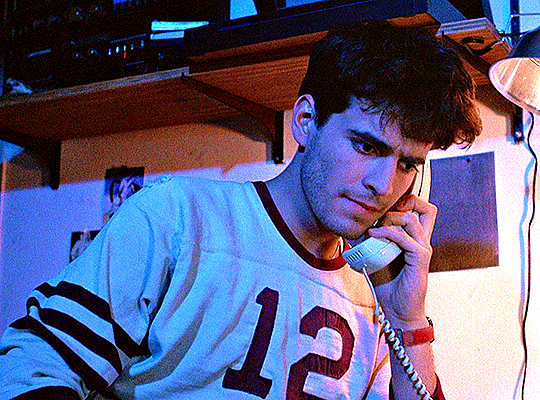
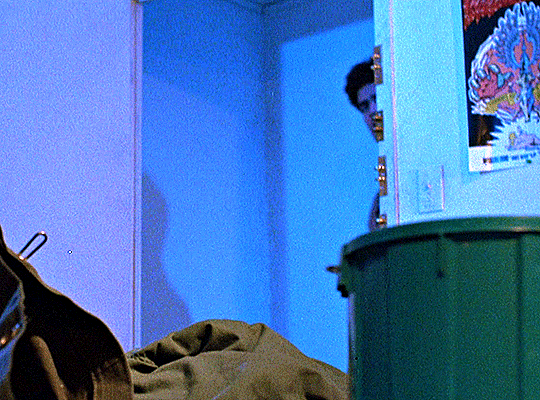
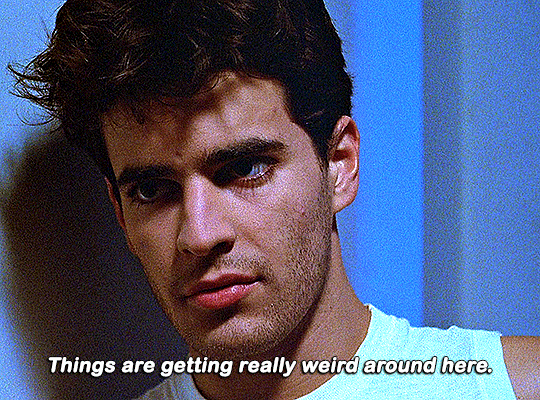
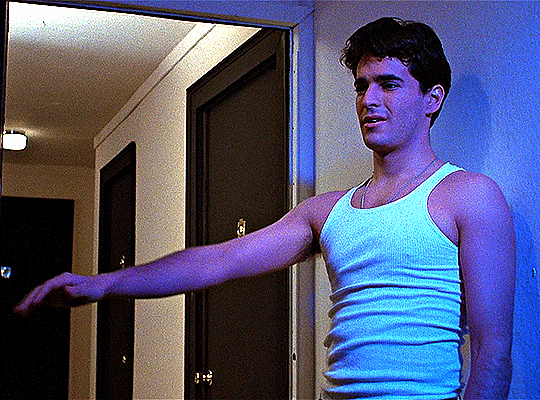
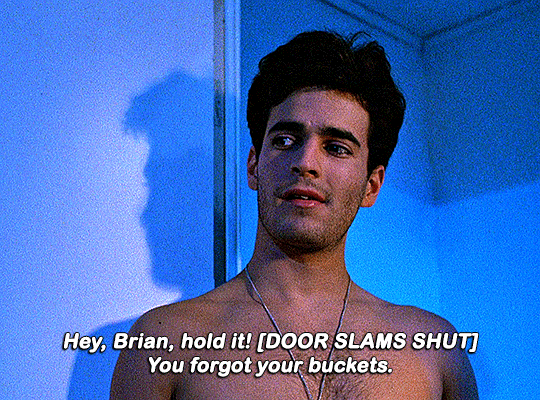
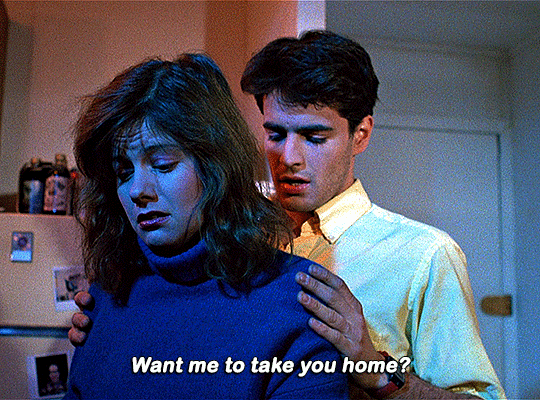
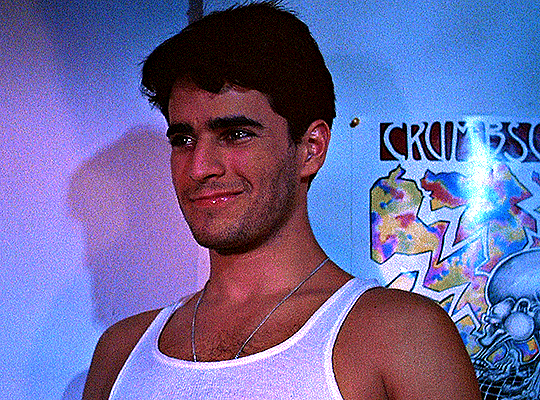
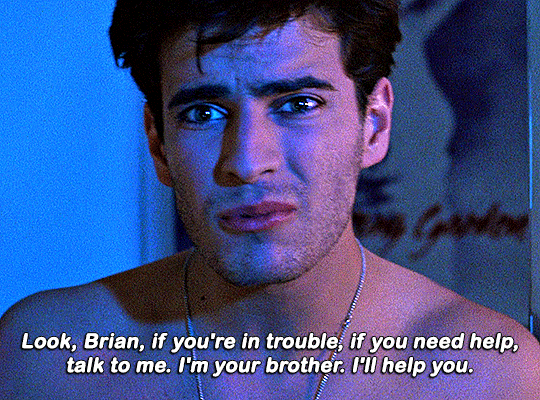
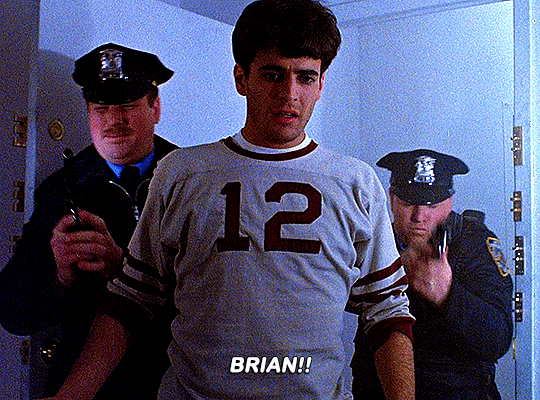
Gordon MacDonald as Mike Brain Damage (1988) dir. Frank Henenlotter
#Brain Damage#Gordon MacDonald#Jennifer Lowry#Frank Henenlotter#guys#movies#*#**#filmedit#horroredit#userbrittany#userlenie#userlosthaven#userscary#holesrus#flashing tw
718 notes
·
View notes
Text



Gordon MacDonald as Mike
Brain Damage (1988)
351 notes
·
View notes
Text

#movies#polls#brain damage#brain damage movie#brain damage 1988#80s movies#frank henenlotter#rick hearst#jennifer lowry#gordon macdonald#requested#have you seen this movie poll
122 notes
·
View notes
Text
BRAIN DAMAGE Reviews of Frank Henenlotter's satrirical horror
‘It’s a headache from Hell!’ Brain Damage is a 1988 American comedy horror film written and directed by Frank Henenlotter (Bad Biology; Frankenhooker; Basket Case and sequels). The movie stars Rick Hearst (The Vampire Diaries; Warlock III), Gordon MacDonald and Jennifer Lowry. TV horror host John Zacherley provided the voice of creature “Elmer/Aylmer”. Street Trash (1987) director Jim Muro��

View On WordPress
#1988#Blu-ray#Brain Damage#comedy horror#Frank Henenlotter#Gordon MacDonald#Jennifer Lowry#John Zacherley#movie film#parasite#review reviews#Rick Hearst#trailer
1 note
·
View note
Text

"Thank you all for joining us on this esteemed day, especially considering the recent weather."

"It is my great pleasure to announce the official opening of Whibley's first ever urgent care medical centre," Mayor Diane Green-MacDonald said proudly. She waited for applause but the small crowd of attendees left her in an awkward pause instead.

"With this new hospital facility," she continued, "we will finally be able to provide Whibley residents, as well as neighbouring cities, a level of high medical care that was otherwise sorely lacking in our community. Dr. Irene Hill will run as chief medical officer interim while we recruit more healthcare professionals in the area."

"I will now accept questions and pictures."
#storytelling#diane green macdonald#collin macdonald#whibley#sarah barber#reginald ii barber#gordon marion#john macdonald#will rose#the beginning#sims 2#ts2#irene hill#winter 4
13 notes
·
View notes
Text
The (Disputable) Macdonald Hall Timeline:
since the dawn of time, fans of this niche canadian book series have been plagued by Gordon Korman’s insistence on making the boys time at school timeless, and by proxy, providing no clear passage of time. at all.
wikipedia helpfully provides the only indication of age is “too young to shave” but technically, this isn’t true. in that same book (This Can’t Be Happening) Boots indeed recalls “his Grade 8 field trip” which would imply they are in grade 9.
this is literally impossible.
i was personally driven insane by this notion.
so, i decided to make an obviously entirely factual timeline for all 7 books in the franchise (and graduation for fun because they don’t mention it in book 7, which means it’s not their last year yet) based on comments made throughout the story.
the START dates for the books are all absolutely accurate, but the length is a little fishy (pardon the pun) because unfortunately they almost never confirm how long it’s been since the start of the book by the end.
the holiday dates are based off of the modern toronto school calendar as well as me asking people i know who went to school in canada in the early 80s so while they may not be EXACT, they’re as close as we’re gonna get.
so without further ado, bruno and boots antics now helpfully provided with dates:

feel free to send an ask if you want to see any of my evidence for the start of books that AREN’T right after summer or the length of certain stories cause i’d be happy to tell you!
and yes i did use apple calendar for this, i think it makes me look even more insane and that’s pretty funny
48 notes
·
View notes
Text





















Series Premiere
Lock-Up - Stakeout - Syndicated - September 26, 1959
Crime Drama
Running Time: 30 minutes
Written by Gene L. Coon
Produced by Henry S. Kesler
Directed by Henry S. Kesler
Stars:
Macdonald Carey as Herbert L. Maris
John Doucette as Lt. John Weston
Leo Gordon as Ed Sparks
Peggy Knudsen as Margie Cleaver
Jack Hogan as Robert Arnold
Neil Grant as Harold Stern
George Russo as George Gault (as John Duke)
Charles Davis as Thompson
Byron Morrow as Detective at 2nd Desk
Chuck Webster as Detective at 1st Desk
Joel Riordan as Fake Golfer
Victor Tayback as Mr. Malloy
Hal Auerbach as Hal Hoover
Walter Stocker as Second Cop
Peter Dane as
Diane DeLaire as Mrs. Bacon
Rosemary Day as Woman at 2nd Desk
#Stakeout#TV#Lock Up#1950's#1959#Crime Drama#Syndicated#Macdonald Carey#John Doucette#Leo Gordon#Peggy Knudson#Jack Hogan#Series Premiere
2 notes
·
View notes
Text




The Working Man (1933) John G. Adolfi
October 29th 2024
#the working man#1933#john g. adolfi#george arliss#bette davis#theodore newton#hardie albright#j. farrell macdonald#gordon westcott#the adopted father#pre-code
2 notes
·
View notes
Text
Dear Gordon Jackson,
Happy Birthday!!
Today is Gordon Jackson's 1 century birthday so I created music video. His gentleness and Dignity was special, and I also like his sacred voice...!
I've been so into him since I watched "The Great Escape." I really like Mac and Roger and I started checking their other plays daily.
Again, Happy Birthday and Thank him for his unforgettable works.
"The Great Escape"(1966)/ "The Foreman Went to France"(1942)/"Nine Men"(1943)/"Millions Like Us"(1943)/"Stop Press Girl"(1949)/"The Night of the Generals"(1967)/"Upstairs, Downstairs"(1971-1975)/"The Professionals"(1977-1983)
youtube
#gordon jackson#the great escape#the night of the generals#upstairs downstairs#the professionals#the foreman went to france#nine men#millions like us#stop press girl#hudson#angus hudson#cowley#george cowley#mac#sandy macdonald
10 notes
·
View notes
Text
SpeakEasy’s “Pru Payne” Is A Must See for Fans of Fabulous Theater
Karen MacDonald and Gordon Clapp in SpeakEasy Stage Company’s production of Pru Payne.Photo: Nile Scott Studios By Shelley A. Sackett Karen MacDonald, recently introduced as “the empress of Boston,” adds another gem to her tiara with her portrayal of Prudence Payne, a Dorothy Parker-esque reviewer whose sharp wit, acid tongue and encyclopedic familiarity with minutiae of all things cultural…

View On WordPress
0 notes
Text
When Lieutenant-General Robert Baden-Powell launched the Boy Scout movement in 1908, he needed a hero his boys would respect. [...]
Civilization sapped a man's strength: as Baden-Powell put it some years later, 'with its town life, buses, hot-and-cold water laid on, everything done for you,' it tended 'to make men soft and feckless ... God made men to be men. The middle class had to lead the way, and take a lesson from the Empire. The colonists risking their lives in Canada, Australia, New Zealand, or Africa had strength and initiative; in contrast to the bored or indifferent or pleasure-seeking islanders, they were real men. [...]
The frontier myth supported the frontiersman as a cult figure, it used 'primitive' races such as the 'Red' Indian and the Zulu as examples of martial virility, and, in Baden-Powell at Mafeking, it made the imperial scout a national hero. The outward symbols of the frontiersman - his cowboy hat, his flannel shirt and neckerchief, and perhaps most oddly, his short trousers (as used by Baden-Powell in India and on the South African veld) - dramatized through the Boy Scout movement the call to a revitalized manhood. [...]
The social ideas that informed and inspired the youth movements can be simplified, but they were by no means simple; Scouting cannot be understood without some summary of its historical background. Both it and the other youth movements reflected and were a response to several quite different influences: popular imperialism, social Darwinism, the crisis of masculinity and the search for 'national efficiency,' social concerns about poverty and slum conditions, new theories of education, and the value of fresh air. [...]
For Baden-Powell, the Matabele campaign [a region in what is now known as Zimbabwe] was a succession of hot days and cool nights on the high veld, scouting the Ndebele, tracking their spoor, spying on their positions, escaping their ambushes, killing them in their caves.
In the Matopos hills Baden-Powell learned the necessity of studying his enemy, using the landscape, and the importance of camouflage. Scouting was thus a science, no longer an inbred sense peculiar to the native. [...] Baden-Powell discovered that though the Ndebele were clever in many little ways, they rarely took the trouble to cover their own spoor, and they were useless in the dark. The civilized scout could answer intuition with logic, and meet nature with science.
[Sons of the Empire, The Frontier and the Boy Scout Movement, 1890-1918. Robert H. MacDonald]
While girls wanted to join the Scouts, Baden-Powell rejected this idea, fearing girls’ femininizing influence on boys and that girls would turn into tomboys. He instead advocated for the development of a separate organization, the Girl Guides, to provide girls with distinctive training that centered around their future roles as wives and mothers. [Elizabeth Dillenburg]
[Girl Scouts USA was founded by] Juliette Gordon Low in 1912, a year after she had met Robert Baden-Powell [...] Low was the granddaughter of Juliette Magill Kinzie and John Harris Kinzie, and her maternal grandparents were one of the earliest settlers of Chicago. Juliette Kinzie wrote about her experiences in the Northwest Territory (now the state of Wisconsin) in her book Wau-Bun: The Early Day. Low incorporated some of her grandmother's experiences on the frontier into the traditions of Girl Scouts. [Wikipedia]
Militarism, racist pedagogy, and colonialist violence, some of the strongest threads that wove together Baden-Powell’s two lives, were also at the heart of the genocidal education projects developed by settler states during the nineteenth and twentieth centuries. In Canada, these included the federally funded and church-run Indian Residential Schools, where Scout and Guide groups were thought to provide Indigenous students with an important training in appropriate gender roles and physical discipline.[...] While in Toronto, Baden-Powell also gave an invited speech at the Imperial Education Conference, where he proudly claimed that the Guides and Scouts had been “found particularly useful in the schools for Red Indian children, just as [they] had also proved useful in a like manner on the West Coast of Africa and in Baghdad.” [..]
At the same time, Scouting and Guiding were – and in some contexts, remain – proponents of what historian Philip Deloria calls the modern practice of “playing Indian” – appropriating and mimicking so-called uncivilized and pre-historic Indigenous cultural practices with the aim of strengthening modern white bodies and spirits. [...]
Having non-Indigenous Scouts and Guides don “Indian dress,” participate in “pow wows,” and perform “Indian dances,” then, was an especially complicated proposition in settler states like Canada – places where imaginary Indians and assimilatory government policies collided with Indigenous nations whose members, contrary to contemporary expectations, were stubbornly refusing to die out. [Kristine Alexander and Mary Jane Logan McCallum]
172 notes
·
View notes
Text



Jennifer Lowry and Gordon MacDonald Brain Damage (1988) dir. Frank Henenlotter
#Brain Damage#Gordon MacDonald#Jennifer Lowry#Frank Henenlotter#movies#*#**#filmedit#horroredit#userbrittany#userlenie#userlosthaven#userscary
130 notes
·
View notes
Text
I had the privilege of being able to see all of them on Netflix and marvelling at how perfect the adaptations were to the 2010s and 2020s. Hopefully one day there'll be more :)
the 3 tv movies were perfect. I wish they had made more.
13 notes
·
View notes
Text
My 25 Most Reread Books
an updated list with correct answers
Queen’s Thief series, Megan Whalen Turner. (started reading it. had a breakdown. been rereading it non-stop ever since) guessed by @contagiousgrace
Pride and Prejudice, by Jane Austen. (infinitely rereadable blueprint for life love and everything) guessed by @contagiousgrace
Secret Garden, by Frances Hodgson Burnett. (phonetically spelled accents are your friend) guessed by @contagiousgrace
Two Princesses of Bamarre, by Gail Carson Levine. (sisterful) guessed by @scrunchie-face
Sorcery and Cecelia, by Patricia C. Wrede and Caroline Stevermer (epistolary) guessed by @lovesodeepandwideandwell
The Hero and the Crown, by Robin McKinley. (here there be dragons) guessed by @cakeyouareoh and @drharleyquinn-medicinewoman
The Black Stallion, by Walter Farley. (the entirety of my horse girl phase) guessed by @iamfitzwilliamdarcy
The Goose Girl, by Shannon Hale. (fairy tale retelling) guessed by @contagiousgrace
Alanna: The First Adventure & the Tortall series, by Tamora Pierce. (second wave feminism fantasy) guessed by @cakeyouareoh
Discworld series, by Terry Pratchett. (sprawling) guessed by @sparrowposting
The Fellowship of the Ring, by J.R.R. Tolkien. (the road to hell is paved with my good intentions to reread the sequels) guessed by Maria @itspileofgoodthings
Ender’s Game, by Orson Scott Card. (only sci-fi on the list) guessed by @cakeyouareoh
The Raven Cycle, by Maggie Stiefvater. (infects you with an unkillable parasite which requires rereading once a year) guessed by @leyezahmae
Folk of the Air trilogy, by Holly Black. (it’s trash but it’s pure fairy story) guessed by @iamfitzwilliamdarcy
Sun and Moon, Ice and Snow, by Jessica Day George. (fairy tale retelling) guessed by @imissthembutitwasntadisaster
Little Women, by Louisa May Alcott (more sisterful) guessed by @scrunchie-face
Inkheart, by Cornelia Funke (oh no we’ve been captured…again) guessed by a lot of people!
The BFG, by Roald Dahl. (personal favorite from classic children’s author) guessed by @iamfitzwilliamdarcy
Spinning Silver, by Naomi Novik. (fairy tale retelling) guessed by @sparrowposting
Flip, by David Lubar. (technically might be sci fi actually. aliens and history and high school) guessed by @recalcitrantlycaffeinated
Macdonald Hall series by Gordon Korman. (Canadian pranks) guessed by @cakeyouareoh
A Wrinkle in Time, by Madeleine L’Engle (shit is this sci fi too damn it) guessed by @tapferhills
Warrior Heir & Wizard Heir, by Cinda Williams Chima. (everyone knows there are three types of boy: fighty magic and slut) guessed by @iamfitzwilliamdarcy and @lovesodeepandwideandwell
The Hunger Games trilogy, by Suzanne Collins. (recently re-obsessed) guessed by @contagiousgrace
The Penderwicks series, by Jeanne Birdsall (even more sisterful) guessed by @casa-anachar and @peregreen
40 notes
·
View notes
Text
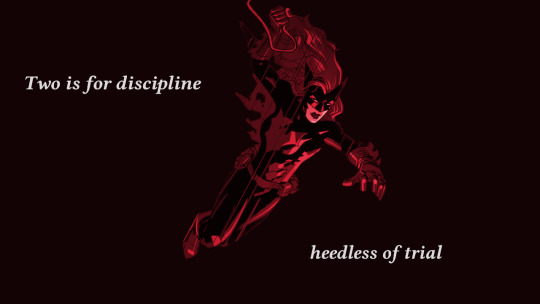
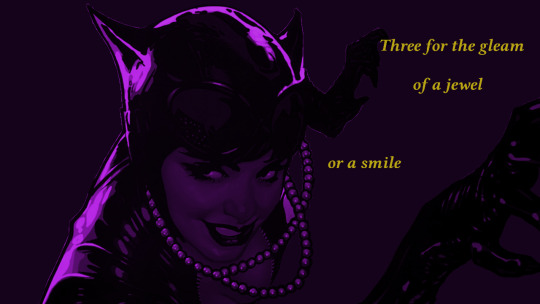
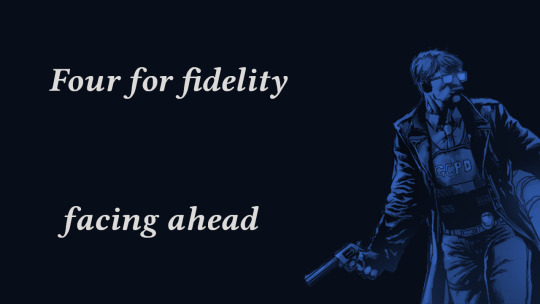

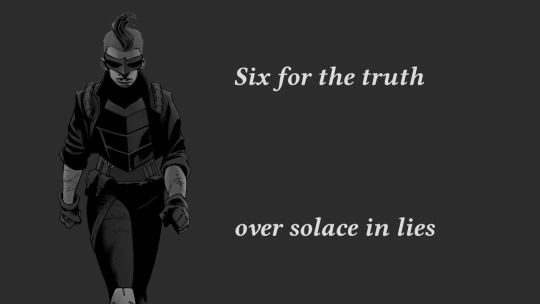
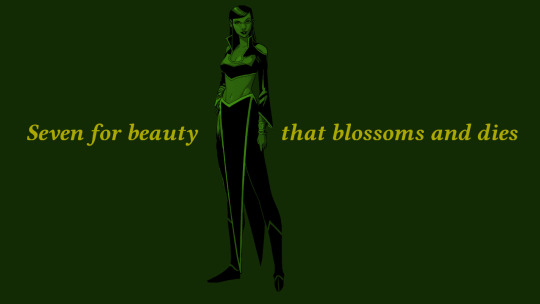
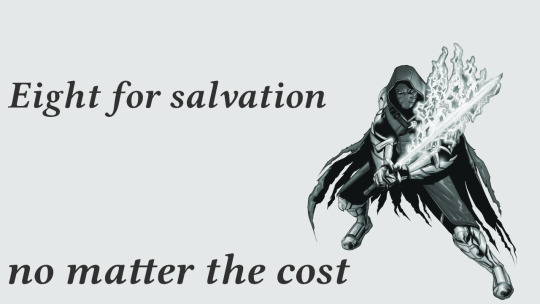
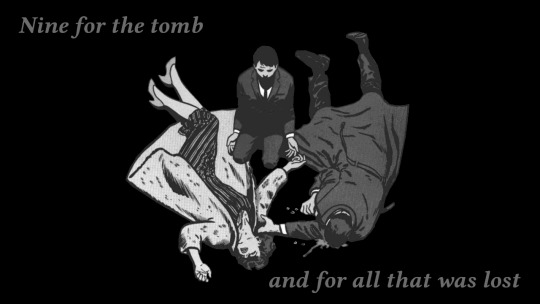
Two fixations for the price of one!
(Don't ask how long I spent editing that Azrael jpeg)
Batwoman art from Detective Comics Rebirth, by Andy Macdonald
Catwoman art from Catwoman v3, by Adam Hughes
Jim Gordon art from Batman Eternal, by Jason Fabok
Alfred Pennyworth art from Batman vs Robin, by Mahmud Asrar
Bluebird art from Batman Eternal, by Alvaro Martinez
Talia al Ghul art from DCeased: Hope At World's End, by Marco Fallia
Azrael art from Batman & Robin Eternal, by Roge Antonio
Wayne family art from Batman: Year One, by David Mazzuccelli
Text from The Locked Tomb, by Tamsyn Muir
#batfam#tlt#batwoman#kate kane#catwoman#selina kyle#jim gordon#alfred pennyworth#harper row#bluebird#talia al ghul#jean-paul valley#azrael#bruce wayne#martha wayne#thomas wayne#my edit
131 notes
·
View notes
Text
Best Reads of 2024
this year i read 300 books. which i think is impressive but not as impressive as it sounds bc many of these books were very short, easy reads meant to be like, stuff you read at the airport or sitting by the pool on vacation. so it's not like i was tackling the harvard classics. i also read extremely fast; it only takes me about an hour to do 300 pages unless it's a super dense complex text. that said, here is a list of all the books i read this year that i would rate 4 stars or higher, separated by genre: Fantasy/Magical Realism: The Tainted Cup by Robert Jackson Bennett Highfire by Eoin Colfer Tehanu by Ursula K. Le Guin Gifts by Ursula K. Le Guin The Last Tale of the Flower Bride by Roshani Chokshi Chlorine by Jade Song The Passion by Jeanette Winterson The Magic Toyshop by Angela Carter Realistic Fiction: We Are Not Like Them by Christine Pride & Jo Piazza Young Jane Young by Gabrielle Zevin My Absolute Darling by Gabriel Tallent Only Child by Rhiannon Navin Movie Star by Lizzie Pepper Prima Facie by Suzie Miller Acts of Desperation by Megan Nolan Marjorie Morningstar by Herman Wouk The Subtweet by Vivek Shraya All Grown Up by Jami Attenberg Piglet by Lottie Hazell The List by Yomi Adegoke A Winter's Rime by Carol Dunbar The Resurrection of Joan Ashby by Cherise Wolas
Mystery/Thriller: Queenpin by Megan Abbott Bury Me Deep by Megan Abbott Beware the Woman by Megan Abbott Firekeeper's Daughter by Angeline Boulley The Guest by Emma Cline Advika and the Hollywood Wives by Kirthana Ramisetti Kala by Colin Walsh Descent by Tim Johnston Wahala by Nikki May When We Were Bright and Beautiful by Jillian Medoff We Could Be Beautiful by Swan Huntley Bright Young Women by Jessica Knoll Nothing Can Hurt You by Nicola Maye Goldberg Fruit of the Dead by Rachel Lyon The Lagos Wife by Vanessa Walters Grown by Tiffany D. Jackson Yes, Daddy by Jonathan Parks-Ramage Cape Fear by John D. MacDonald Sea Wife by Amity Gaige Last Seen Wearing by Hilary Waugh The Black Cabinet by Patricia Wentworth Historical Fiction: Everyone Knows Your Mother is a Witch by Rivka Galchen Gilded Mountain by Kate Manning All You Have to Do is Call by Kerri Maher Cruel Beautiful World by Caroline Leavitt Payback by Mary Gordon A Dangerous Business by Jane Smiley The Affairs of the Falcons by Melissa Rivero Longbourn by Jo Baker The Hazelbourne Ladies Motorcycle and Flying Club by Helen Simonson Go to Hell Ole Miss by Jeff Barry The Divorcees by Rowan Beaird Consequences by Penelope Lively Iron Curtain: A Love Story by Vesna Goldsworthy Homestead by Melinda Moustakis Not Our Kind by Kitty Zeldis Hamnet by Maggie O’Farrell Teddy by Emily Dunlay Science Fiction: Prophet Song by Paul Lynch Aesthetica by Allie Rowbottom Fever by Deon Meyer The Salt Line by Holly Goddard Jones Land of Milk and Honey by C. Pam Zhang Gold Fame Citrus by Claire Vaye Watkins A Children’s Bible by Lydia Millet Briefly Very Beautiful by Roz Dineen
Romance: Everything’s Fine by Cecilia Rabess Adelaide by Genevieve Wheeler Meant to Be Mine by Hannah Orenstein When Katie Met Cassidy by Camille Perri Major Pettigrew’s Last Stand by Helen Simonson American Royalty by Tracey Livesay The One by Julie Argy The Mountain Between Us by Charles Martin Queen of Urban Prophecy by Aya de Léon That Dangerous Energy by Aya de Léon The Dove in the Belly by Jim Grimsley Fatima Tate Takes the Cake by Khadija VanBrakle Faro’s Daughter by Georgette Heyer Horror: Red Rabbit by Alex Grecian The Parliament by Aimee Pokwatka Cujo by Stephen King Night Watching by Tracy Sierra The Garden by Clare Beams The House of Ashes by Stuart Neville The Suicide Motor Club by Christopher Buehlman True Crime: In Cold Blood by Truman Capote Columbine by Dave Cullen Kent State: Four Dead in Ohio by Derf Backderf Bad Blood: Secrets and Lies in a Silicon Valley Startup by John Carreyrou While Idaho Slept: The Hunt for Answers in the Murders of Four College Students by J. Reuben Appelman The Bishop and the Butterfly: Murder, Politics, and the End of the Jazz Age by Michael Wolraich Fatal Vision by Joe McGinniss Billion Dollar Whale: The Man Who Fooled Wall Street, Hollywood, and the World by Tom Wright and Bradley Hope
History: Midnight in Chernobyl: The Untold Story of the World’s Greatest Nuclear Disaster by Adam Higginbotham Capote’s Women: A True Story of Love, Betrayal, and a Swan Song for an Era by Laurence Leamer The Astronaut Wives Club by Lily Koppel The Burning Blue: The Untold Story of Christa McAuliffe and Nasa’s Challenger Disaster by Kevin Cook The Splendid and the Vile: A Saga of Churchill, Family, and Defiance During the Blitz by Erik Larson Grace and Power: The Private World of the Kennedy White House by Sally Bedell Smith As Long as We Both Shall Love: The White Wedding in Postwar America by Karen M. Dunak Babysitter: An American History by Miriam Forman-Brunell Game Change: Obama and the Clintons, McCain and Palin, and the Race of a Lifetime by John Heilemann and Mark Halperin All She Lost: The Explosion in Lebanon, the Collapse of a Nation and the Women who Survive by Dalal Mawad Psychology: Hidden Valley Road: Inside the Mind of an American Family by Robert Kolker The Anxious Generation: How The Great Rewiring of Childhood is Causing an Epidemic of Mental Illness by Jonathan Haidt Beautiful Boy: A Father’s Journey Through His Son’s Addiction by David Sheff Misdiagnosed: One Woman’s Tour of -And Escape From- Healthcareland by Jody Berger Stolen Child: A Mother’s Journey to Rescue Her Son from Obsessive Compulsive Disorder by Laurie Gough Zig-Zag Boy: A Memoir of Madness and Motherhood by Tanya Frank I’m Glad My Mom Died by Jennette McCurdy Us, After: A Memoir of Love and Suicide by Rachel Zimmerman Everything Is Fine: A Memoir by Vince Granata Juliet the Maniac by Juliet Escoria
Memoir: Upstairs At The White House by J.B. West A Mother’s Reckoning: Living in the Aftermath of Tragedy by Sue Klebold Goodbye, Sweet Girl: A Story of Domestic Violence and Survival by Kelly Sundberg This Boy We Made: A Memoir of Motherhood, Genetics, and Facing the Unknown by Taylor Harris I Am, I Am, I Am: Seventeen Brushes with Death by Maggie O’Farrell
Fragile Beginnings: Discoveries and Triumphs in the Newborn ICU by Adam Wolfberg The Longest Race: Inside the Secret World of Abuse, Doping, and Deception on Nike’s Elite Running Team by Kara Goucher and Mary Pilon Remedies for Sorrow: An Extraordinary Child, a Secret Kept from Pregnant Women, and a Mother’s Pursuit of the Truth by Megan Nix Brazen: My Unorthodox Journey from Long Sleeves to Lingerie by Julia Haart Minding the Manor: The Memoir of a 1930s English Kitchen Maid by Mollie Moran Love in the Blitz: The War Letters of Eileen Alexander to Gershon Ellenbogan by Eileen Alexander Any Given Tuesday: A Political Love Story by Lis Smith
The Apology by Eve Ensler Wild Game: My Mother, Her Secret, and Me by Adrienne Brodeur
One Way Back: A Memoir by Christine Blasey Ford Biography: The Matriarch: Barbara Bush and the Making of an American Dynasty by Susan Page Untold Power: The Fascinating Rise and Complex Legacy of First Lady Edith Wilson by Rebecca Boggs Roberts King: A Life by Jonathan Eig Louisa: The Extraordinary Life of Mrs. Adams by Louisa Thomas
American Girls: One Woman’s Journey into the Islamic State and Her Sister’s Fight to Bring Her Home by Jessica Roy Susan, Linda, Nina, and Cokie: The Extraordinary Story of the Founding Mothers of NPR by Lisa Napoli
Gender: Becoming Nicole: The Transformation of an American Family by Amy Ellis Nutt The Feminine Mystique by Betty Friedan We Were Feminists Once: From Riot Grrrl to CoverGirl®, the Buying and Selling of a Political Movement by Andi Zeisler All the Rage: Mothers, Fathers, and the Myth of Equal Partnership by Darcy Lockman Ain’t I a Woman: Black Women and Feminism by bell hooks Enslaved Women in America: From Colonial Times to Emancipation by Emily West You’ll Do: A History of Marrying for Reasons Other Than Love by Marcia A. Zug The Red Menace: How Lipstick Changed the Face of American History by Ilise S. Carter Odd Girls and Twilight Lovers: A History of Lesbian Life in Twentieth-Century America by Lillian Faderman
30 notes
·
View notes